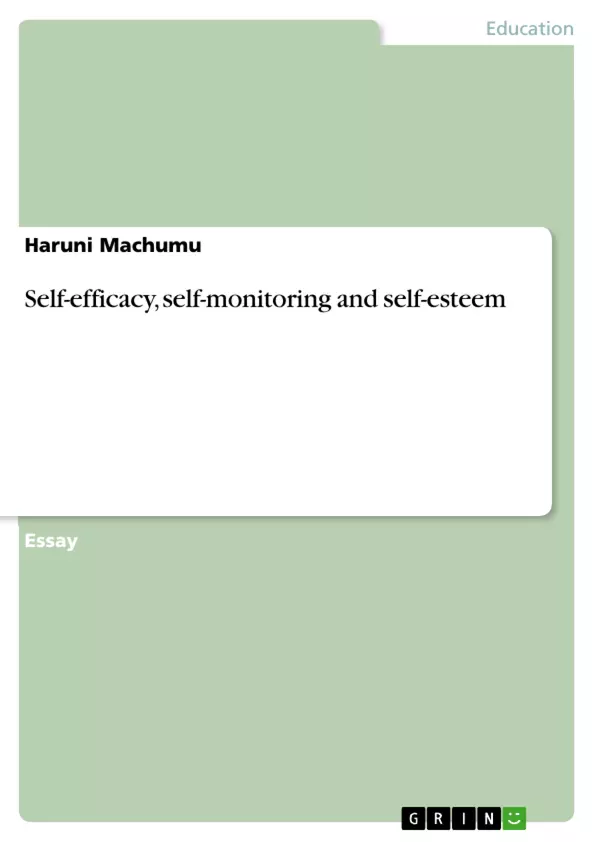This paper attempts to address the concept of self in three variables that are self-esteem, self-efficacy and self-monitoring among teachers and educational managers. The main purpose of this paper is to express the practical implications of the self (self esteem, self efficacy and self-monitoring) to educational managers. It also focuses on the influences of success and failure of an individual to achieve organizations goals.
Inhaltsverzeichnis (Table of Contents)
- Introduction
- Conceptualization of Self esteem
- Typology of Self esteem
- Practical implication of self-esteem to educational management
- Self-efficacy
- Practical Implications of Self-efficacy to educational management
- Self-Monitoring
- Practical implication of self-monitoring to educational management
- Conclusion
Zielsetzung und Themenschwerpunkte (Objectives and Key Themes)
This paper explores the concepts of self-esteem, self-efficacy, and self-monitoring in the context of teachers and educational managers. The primary objective is to examine the practical implications of these self-related constructs for improving organizational success.- The influence of self-esteem on teacher performance and overall organizational well-being.
- The role of self-efficacy in shaping teacher behavior, motivation, and resilience.
- The impact of self-monitoring on teacher adaptability and social interactions within the school environment.
- The importance of understanding individual differences in self-related constructs for effective educational management.
- The application of managerial strategies to foster positive self-related constructs among teachers.
Zusammenfassung der Kapitel (Chapter Summaries)
- Introduction: Introduces the topic of the paper, focusing on the importance of self-esteem, self-efficacy, and self-monitoring for teachers and educational managers. The paper aims to explore the practical implications of these concepts and their impact on organizational success.
- Conceptualization of Self esteem: Defines self-esteem as a person's overall evaluation of their worth. It explores the connection between self-esteem and teacher behavior, including assertiveness, shyness, confidence, and caution. The concept of high and low self-esteem is introduced as a key typology.
- Typology of Self esteem: Explains the differences between high and low self-esteem, highlighting the positive attributes associated with high self-esteem and the negative consequences of low self-esteem. It emphasizes the importance of self-esteem for a positive attitude towards work and effective relationships.
- Practical implication of self-esteem to educational management: Examines the significance of self-esteem for teacher well-being and organizational success. It outlines managerial strategies, such as rewards, praise, and reinforcement, for promoting high self-esteem among teachers.
- Self-efficacy: Defines self-efficacy as an individual's belief in their ability to achieve desired outcomes. The paper explores the influence of self-efficacy on cognitive, motivational, affective, and selection processes. It highlights the positive impact of high self-efficacy on personal accomplishments and well-being.
- Practical Implications of Self-efficacy to educational management: Addresses the importance of considering previous experiences and performance during recruitment and job assignments. It advocates for training, development, and involvement in decision-making to enhance teacher self-efficacy.
- Self-Monitoring: Defines self-monitoring as the process of regulating behavior to create a favorable impression. It distinguishes between high and low self-monitors, outlining their characteristics and impact on social interactions.
- Practical implication of self-monitoring to educational management: Explores the practical implications of self-monitoring for educational managers, emphasizing the need for sensitivity to individual differences and the use of appropriate management strategies.
Schlüsselwörter (Keywords)
This paper explores the multifaceted nature of self-concept and its application to educational management. Key concepts include self-esteem, self-efficacy, self-monitoring, teacher performance, organizational success, and managerial strategies. The paper analyzes the interplay between these concepts, providing insights into how understanding individual differences can improve educational outcomes.Frequently Asked Questions
What is the difference between self-esteem and self-efficacy?
Self-esteem is an overall evaluation of one's worth, while self-efficacy refers to an individual's belief in their specific capacity to achieve desired goals.
How does self-monitoring affect a teacher's performance?
High self-monitors are more adaptable to social cues and can regulate their behavior to create favorable impressions, which can be beneficial in diverse classroom settings.
Why is self-esteem important for educational managers?
Understanding teacher self-esteem helps managers use appropriate strategies like praise and rewards to foster a positive work environment and organizational success.
What are the consequences of low self-esteem in a school environment?
Low self-esteem can lead to a lack of confidence, reduced motivation, and poor interpersonal relationships, which negatively impacts the teaching-learning process.
How can managers improve teacher self-efficacy?
Managers can enhance self-efficacy through targeted training, professional development, and involving teachers in decision-making processes.
- Citation du texte
- Student and Tutor Haruni Machumu (Auteur), 2011, Self-efficacy, self-monitoring and self-esteem, Munich, GRIN Verlag, https://www.grin.com/document/179270



